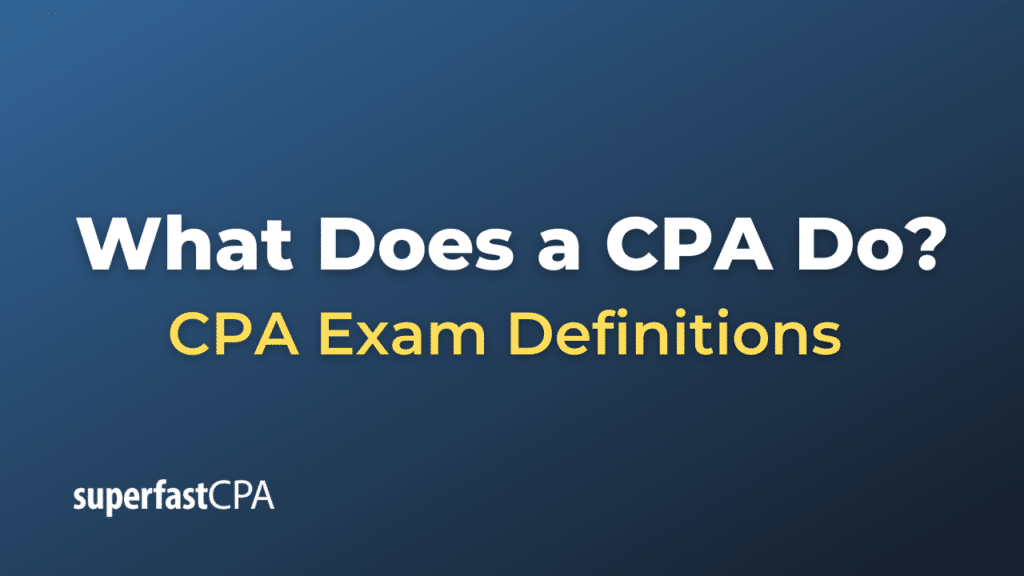What Does a CPA Do
A Certified Public Accountant (CPA) is a financial professional who has met specific educational and experience requirements and has passed the CPA examination. The responsibilities and services offered by CPAs can vary significantly depending on their area of expertise, the nature of their employment, or the specific needs of their clients. Here are some of the common tasks and roles undertaken by CPAs:
Accounting and Bookkeeping
- Maintaining and auditing financial records.
- Preparing financial statements like income statements, balance sheets, and cash flow statements.
Tax Services
- Preparing and filing federal, state, and local tax returns for individuals and businesses.
- Advising on tax planning and tax-saving strategies.
- Representing clients before tax authorities in the event of audits or disputes.
Consulting and Advisory Services
- Advising on business transactions, such as mergers and acquisitions.
- Providing financial planning and investment advice.
- Conducting risk assessments and internal controls reviews.
Audit and Assurance Services
- Conducting independent audits to verify the accuracy of financial statements and compliance with regulations.
- Providing assurance services that go beyond traditional auditing, such as reviewing internal controls or conducting due diligence for mergers and acquisitions.
Forensic Accounting
- Investigating financial discrepancies and fraud.
- Acting as an expert witness in legal cases involving financial matters.
Management Accounting
- Preparing budgets and forecasts.
- Analyzing financial data to assist in decision-making.
- Helping to develop and monitor performance metrics.
Compliance and Regulation
- Ensuring compliance with financial regulations and standards.
- Assisting in the implementation of new accounting standards or tax laws.
Payroll and Human Resources
- Managing or supervising payroll functions.
- Advising on employee benefits and compensation.
Information Technology
- Advising on the selection and implementation of accounting and business software.
- Assisting with data security and fraud prevention.
Education and Training
- Some CPAs serve as educators, teaching accounting and finance courses at the college or university level.
CPAs may work in a variety of settings, including public accounting firms, corporations, government agencies, non-profit organizations, and as solo practitioners. Their skill set is highly valued, and they are often considered experts in financial analysis, tax regulations, and accounting standards.
Example of What Does a CPA Do
Let’s consider a fictional example involving a CPA named Sarah who works at a medium-sized public accounting firm.
Sarah has been hired by a local restaurant chain, “TastyBites,” to provide various accounting and advisory services. TastyBites has recently expanded, opening three new locations, and its management is feeling overwhelmed with the financial complexities that come with growth.
Services Sarah Provides:
- Financial Statement Preparation: Sarah starts by compiling the financial statements for TastyBites for the last fiscal year. This includes the income statement, balance sheet, and cash flow statement.
- Tax Planning and Filing: After the financial statements are prepared, Sarah reviews them to identify tax-saving opportunities. She recommends some adjustments like accelerating certain expenses and delaying some income to minimize the tax liability. She then prepares and files the federal and state tax returns for TastyBites.
- Audit Representation: TastyBites is randomly selected for a state tax audit. Sarah gathers all the necessary documentation and represents the restaurant chain during the audit process, successfully resolving the matter with no additional tax liability.
- Budgeting and Forecasting: Sarah helps the management of TastyBites prepare a budget for the next fiscal year, including revenue forecasts and expenditure estimates. She also sets up a system for monitoring actual performance against the budget.
- Consulting on Expansion: Given that TastyBites is looking to expand even further, Sarah conducts a financial analysis to determine the viability of opening new locations. She also performs due diligence on a potential acquisition.
- Internal Controls Review: Sarah assesses the internal financial controls of TastyBites and recommends improvements. This includes things like implementing a new point-of-sale system and setting up better inventory tracking to reduce waste.
- Payroll Management: Sarah oversees the implementation of a new payroll system that integrates with the existing accounting software, making it easier for TastyBites to manage its growing staff.
- Regular Financial Updates: Sarah sets up a monthly meeting with the TastyBites management team to go over financial performance, discuss any issues, and adjust plans as needed.
Outcome:
With Sarah’s expert advice and ongoing support, TastyBites successfully navigates its period of growth, minimizing tax liability, improving internal controls, and making informed decisions about further expansion.
This example illustrates the multifaceted role a CPA can play in helping a business succeed. Sarah’s expertise in various areas of accounting and finance allows her to provide a comprehensive service package that addresses the unique challenges and opportunities faced by TastyBites.













